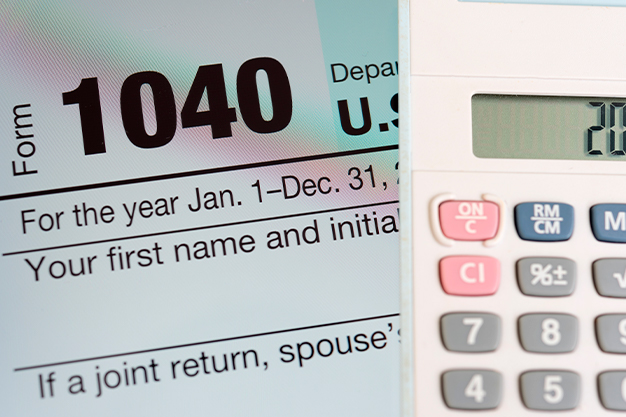Tax season is underway in the U.S. Filing taxes can be a daunting task that’s often left until the last minute
It’s tax season in the U.S., and for many people, filing tax returns can be a daunting task that’s often left until the last minute. But if you want to avoid the stress of the looming deadline, start getting organized as soon as possible.
Whether you do your taxes yourself, go to a tax clinic or hire a professional, navigating the tax system can be complicated and stressful. Courtney Alev, a consumer financial advocate for Credit Karma, recommends you go easy on yourself.
“Take a breath. Take some time, set out an hour, or go through it over the weekend. You’ll hopefully see that it’s a lot simpler than you think,” Alev said.
If you find the process too confusing, there are plenty of free resources to help you get through it.
Here are some things you need to know:
WHEN IS THE DEADLINE TO FILE TAXES?
Taxpayers have until April 15 to submit their returns from 2023.
WHAT DO I NEED TO FILE MY TAX RETURN?
While the required documents might depend on your individual case, here is a general list of what everyone needs:
—Social Security number
—W-2 forms, if you are employed
—1099-G, if you are unemployed
—1099 forms, if you are self-employed
—Savings and investment records
—Any eligible deduction, such as educational expenses, medical bills, charitable donations, etc.
—Tax credits, such as child tax credit, retirement savings contributions credit, etc.
To find a more detailed document list, visit the IRS website.
Tom O’Saben, director of tax content and government relations at the National Association of Tax Professionals, recommends gathering all of your documents in one place before you start your tax return and also having your documents from last year if your financial situation has drastically changed.
O’Saben also recommends taxpayers create an identity protection PIN number with the IRS to guard against identity theft. Once you create a number, the IRS will require it to file your tax return.
HOW DO I FILE MY TAXES?
You can either file your taxes online or on paper. However, there is a great time difference between the two options. Paper filing can take up to six months for the IRS to process, while electronic filing cuts it down to three weeks.
WHAT RESOURCES ARE OUT THERE?
The IRS is piloting a program where you can file your federal taxes online for free called Direct File. This program is now available in 12 states, which include California and New York, and for people who have very simple W-2s, an employee’s wage and tax statement.
Aside from Direct File, IRS offers free guided tax preparation that does the math for you. This is available for people who make $79,000 or less per year. If you have questions while working on your tax forms, the IRS also offers an interactive tax assistant tool that can provide answers based on your information.
Beyond the popular companies such as TurboTax and H&R Block, taxpayers can also hire licensed professionals, such as certified public accountants. The IRS offers a directory of tax preparers across the United States.
The IRS also funds two types of programs that offer free tax help: VITA and the Tax Counseling for the Elderly program (TCE). People who earn $64,000 or less a year, have disabilities or are limited English speakers, qualify for the VITA program. Those who are 60 or older, qualify for the TCE program. The IRS has a site for locating organizations hosting VITA and TCE clinics.
If you have a tax problem, there are clinics around the country that can help you resolve these issues. Generally, these tax clinics also offer services in other languages such as Spanish, Chinese and Vietnamese.
HOW CAN I AVOID MISTAKES IN MY TAX RETURN?
Many people fear getting in trouble with the IRS if they make a mistake. Here’s how to avoid some of the most common ones:
—Double check your name on your Social Security card.
When working with clients, O’Saben always asks them to bring their Social Security card to double-check their number and their legal name, which can change when when people get married.
“You may have changed your name but you didn’t change it with Social Security,” O’Saben said. “If the Social Security number doesn’t match to the first four letters of the last name, the return will be rejected and that will delay processing.”
—Search for tax statements when you have opted out of paper mail.
Many people like to opt out of snail mail but when you do, it can also include your tax documents.
“If you didn’t get anything in the mail doesn’t mean that there isn’t an information document out there that you need to be aware of and report accordingly,” O’Saben said.
—Make sure you report all of your income.
If you had more than one job in 2023, you need the W-2 forms of each.
WHAT ABOUT THE CHILD INCOME CREDIT?
Earlier this year, Congress announced a bipartisan agreement to enhance the current child tax credit. Currently, the tax credit is $2,000 per child, but only $1,600 is refundable. The bill would incrementally increase the maximum refundable child tax credit to $1,800 for 2023 tax returns, $1,900 for the following year and $2,000 for 2025 tax returns.
If this agreement goes through, around 16 million children in low-income families would benefit from this child tax credit expansion, according to the Center on Budget and Policy Priorities. Lawmakers are hoping to move this bill as soon as possible.
WHAT IF I MAKE A MISTAKE?
Mistakes happen, and the IRS takes different approaches depending on each case. In general, if you make a mistake or you’re missing something in your tax records, the IRS will audit you, Alev said. An audit means that the IRS will ask you for more documentation.
“Generally, they are very understanding and willing to work with folks. You’re not going to get arrested if you type in the wrong field,” Alev said.
WHAT IF I HAVEN’T FILED FOR YEARS?
You can file taxes late and, if you were supposed to get a refund, you might still get it. If you haven’t filed for years and you owe money to the IRS, you may be hit with penalties but the agency will can work with you to manage payment plans.
HOW CAN I AVOID SCAMS?
Tax season is prime time for tax scams, said O’Saben. These scams can come via phone, text, email and social media. The IRS uses none of those means to contact taxpayers.
Sometimes scams are even operated by tax preparers so it’s important to ask lots of questions. If a tax preparer says you will get a refund that is larger than what you’ve received in previous years, for example, that may be a red flag, O’Saben said.
If you can’t see what your tax preparer is working on, get a copy of the tax return and ask questions about each of the entries.
HOW LONG SHOULD I KEEP COPIES OF MY TAX RETURNS?
It’s always good practice to keep a record of your tax returns, just in case the IRS audits you for an item you reported years ago. O’Saben recommend keeping copies of your tax return documents for up to seven years.
HOW DO I FILE A TAX EXTENSION?
If you run out of time to file your tax return, you can file for an extension. However, it is important to remember that the extension is only to file your taxes, not to pay them. If you owe taxes, you should pay an estimated amount before the deadline so you avoid paying penalties and interest. If you expect to receive a refund, you will still receive your money when you file your taxes.
Filing an extension will give you until Oct. 15 to file your taxes. You can file for an extension through your tax software or preparer of preference, the IRS Free File tool or via mail.
WHAT HAPPENS IF YOU FILE TAXES LATE?
If you missed the tax deadline and you don’t file for an extension, there are several penalties that you might receive. If you missed the deadline you might receive a failure-to-file penalty. This penalty will be 5% of the unpaid taxes for each month the tax return is late, according to the IRS.
If you owe taxes and you didn’t pay them prior to the tax deadline, you will receive a failure-to-pay penalty. Interest will also be charged on both taxes and penalties owed. If you are due for a refund, you will not receive a penalty and you will receive your tax return payment. If you had special circumstances that meant you were unable to file or pay your taxes on time, you might be able to remove or reduce your penalty.
If the amount of taxes you owe becomes too large, you can apply for a payment plan. Payment plans will allow you to pay off over time.
We are a tax accounting and financial and business advisory firm based in Houston, TX, with more than 25 years of experience. Our goal is to support our national and international clients to achieve their financial, operational and accounting objectives.
We offer a wide variety of tax planning services for both companies and individuals. Tax planning can save you time and money.
Rodolfo Maya
CEO & Founder
MABE International Advisors, Inc.
Tel. + 1-281-741-3691
MABE International Advisors, Inc.
11511 Katy Fwy Suite # 640
Houston, TX 77079
Tel. 281-741-3691
Hours: Monday-Friday 9 AM – 5 PM
OFFICES IN MEXICO
Tampico, Tamps
Loma Azul 207
Col. Lomas de Rosales
Tampico, Tamps., México
Tel.: +52 (833) 217.85.00 al 02
Querétaro, Qro.
Rufino Tamayo No. 7-101
Fracc. Pueblo Nuevo
Corregidora
Querétaro, México
Tel: +52 (442) 225.32.71
Monterrey, NL
Dr. Jose Luna Ayala #204 1er. piso
Col. San Jerónimo
Monterrey, Nuevo León, México
Tel: +52 (81) 2317.48.80



